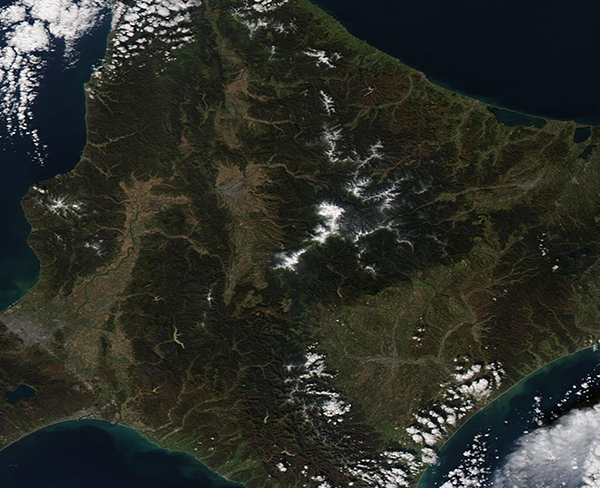Images
October 27, 2022 - Snow in the Mountains of Hokkaido
Tweet
Stormy weather and dropping temperatures brought fresh snow to the Ishikari Mountains, Hokkaido, Japan in late October 2022.
The Moderate Resolution Imaging Spectroradiometer (MODIS) on board NASA’s Aqua satellite acquired a true-color image of the winter-like scene on October 26, the day after clouds cleared. Snow sits on the highest elevations and is most abundant in Daisetsuzan National Park, an area where summer is short (July to August), September is laden with multi-colored leaves, and October brings the first winter snows.
True-color images use three different MODIS bands (1,4,3) to create a view much like would be seen by the human eye, if we could actually see from space. Scientists often use different sets of MODIS data to create images that look different than human vision. Called false-color images, they are helpful in highlighting various features of scientific interest.
In this true-color image, the mountain snow appears white and so do the clouds scattered over the island. In addition, the snow appears somewhat dark and grainy in some places, giving an appearance much like one would see with fog. In other areas, the zig-zag patterns suggest either snow on mountain peaks or fog in mountain valleys.
By selecting a false-color image that uses MODIS bands 7,2,1, it becomes simple to sort out snow from cloud and fog. In this type of image, snow looks bright electric blue while most clouds appear white except for high, very cold cloud containing ice crystals which may be tinted with light electric blue. Fog, which is low cloud, would also appear white while vegetation looks green.
Thanks to the NASA Worldview App, comparing false-color and true-color images are fast and easy. To see a roll-over comparison between this Aqua MODIS true-color image and the same image in false-color, click here.
Image Facts
Satellite:
Aqua
Date Acquired: 10/26/2022
Resolutions:
1km (218 KB), 500m (580.8 KB), 250m (401.4 KB)
Bands Used: 1,4,3
Image Credit:
MODIS Land Rapid Response Team, NASA GSFC
Tweet
Stormy weather and dropping temperatures brought fresh snow to the Ishikari Mountains, Hokkaido, Japan in late October 2022.
The Moderate Resolution Imaging Spectroradiometer (MODIS) on board NASA’s Aqua satellite acquired a true-color image of the winter-like scene on October 26, the day after clouds cleared. Snow sits on the highest elevations and is most abundant in Daisetsuzan National Park, an area where summer is short (July to August), September is laden with multi-colored leaves, and October brings the first winter snows.
True-color images use three different MODIS bands (1,4,3) to create a view much like would be seen by the human eye, if we could actually see from space. Scientists often use different sets of MODIS data to create images that look different than human vision. Called false-color images, they are helpful in highlighting various features of scientific interest. In this true-color image, the mountain snow appears white and so do the clouds scattered over the island. In addition, the snow appears somewhat dark and grainy in some places, giving an appearance much like one would see with fog. In other areas, the zig-zag patterns suggest either snow on mountain peaks or fog in mountain valleys.
By selecting a false-color image that uses MODIS bands 7,2,1, it becomes simple to sort out snow from cloud and fog. In this type of image, snow looks bright electric blue while most clouds appear white except for high, very cold cloud containing ice crystals which may be tinted with light electric blue. Fog, which is low cloud, would also appear white while vegetation looks green.
Thanks to the NASA Worldview App, comparing false-color and true-color images are fast and easy. To see a roll-over comparison between this Aqua MODIS true-color image and the same image in false-color, click here.
Image Facts
Satellite:
Aqua
Date Acquired: 10/26/2022
Resolutions:
1km (218 KB), 500m (580.8 KB), 250m (401.4 KB)
Bands Used: 1,4,3
Image Credit:
MODIS Land Rapid Response Team, NASA GSFC




